#gaijin
Text

Spoiler: WarThunder community is known for leaking military classified documents
#video games#video game#video#game#games#gaming#gamer#gamers#PC#PS#XBOX#WarThunder#War Thunder#Gaijin#China#Balloon#USA
7K notes
·
View notes
Text
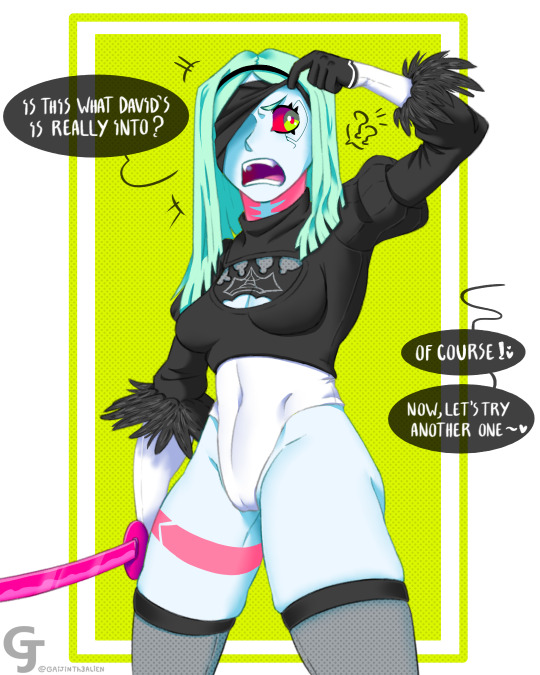

Rebecca's cosplay ! (part 01 of ???)
Part 02 will be posted soon enough
#my art#digital art#gaijin#artists on tumblr#digital drawing#art#ns/fw art#cosplay#cyberpunk#cyberpunk 2077#edgrunners#rebecca#nier automata#2b#2b nier automata#crossover#ns/fw post#cyberpunk edgerunners
122 notes
·
View notes
Text
Criticism of Blue Eyed Samurai
Well, I just watched Blue Eyed Samurai. Been spotting several positive clickbait thumbnails of it, so even though I didn't have high expectations based on the trailer, I gave it a go. And well, it was what I feared it was. I still enjoyed it though! And it's an engaging story, just not what I wish it was. Anyways, I wrote a comment on Reddit about it, which I thought I'd repost here.
Edit: I ended up going in and reordering some paragraphs under headings, as people on Reddit replied to by comment. Noticing people are nitpicking the historical accuracy of my commentary, which wasn't really what I was concerned about. It's more that certain cues in these stories make me expect certain things.
The main point of much of this text is to look into what makes Blue Eyed Samurai a noticeably American story, by comparing it to other jidaigeki stories with a similar setting made for and by Asian people, and stories set in Asia made by Americans (for Americans).
🚧 NB! I'm still working on the text. Text marked in cursive are just notes, so please ignore them for now! 🚧
Overall verdict
I did also think of Ghost of Tsushima while watching, but in the sense that Blue Eyed Samurai lacks what I liked about it. Ghost of Tsushima did a great job with its Japanese localization, and referenced actual bushido conduct, although a little bit off still. Blue Eyed Samurai throws around words like samurai and honor, but doesn't appear to actually understand what these words entails, and only focuses on the superficial badassery of it (...)
But overall, great choreography and compositing, engaging story and characters ... Blue Eyed Samurai is good, but does veer into the uncanny valley for me, which I know was an issue Asians had with ATLA. Guess I felt it a little bit more with Blue Eyed Samurai due how much (unrealistic) violence and (meaningless) sex is glorified, and made me question what exactly the overall moral message of the story was supposed to be beyond simply "revenge plots are cool but also destructive." As somebody else said, it's giving "guts and tits for the people."
Glorification of the badassery of revenge
So, somebody replied that they thought we should be careful about romanticizing bushido, and provided examples of samurai being deceitful. This is my reply.
You missed my point. I did not want Blue Eyed Samurai to romanticize bushido, I wanted it to discuss and explore it, exactly because it throws around words like honor and samurai. A first step towards this is to acknowledge that Mizu is not a samurai.
What is Mizu?
We could argue that she is a ronin, but then she'd technically must've been serving a lord as a samurai in the past, and should be at least be a tiny bit concerned with chivalry (at least enough to discuss or talk about it), which we know isn't the case. Mizu is closer to being a shinobi/ninja, since her goal is to assassinate her 4 maybe fathers. Another thing Mizu shares with shinobi is that both are often criticised by samurai because of their penchant for ambushes and lack of concern for bushido / warriors code. Yet she breaks the mold of being a shinobi, since she doesn't really sneak around in (civilian) disguise and will openly brawl her way through a dojo and into a fort.
Mizu has a lot in common with the titular protagonis of the manga Azumi. Both are female assassins with foreign blood (bluish eyes) fighting during the Sakoku policy. While Mizu's motivation is simply revenge for the injustice she and her mother suffered at the hands of the gaijin faction, in Azumi the motivation is to prune the country like a bonsai tree off individuals which may threathen a new age of peace, and prevent the country from slipping back into the Sengoku period of civil war.
But where characters in Blue Eyed Samurai is heavily protected by plot armor, allowing Mizu to be an almost invincible pin cushion, no one is safe in Azumi and injured characters requires months to recover and heal from cuts.

While writing this, I recalled that in episode 5, they interjected a story about a samurai marrying and fathering a child with a woman who descended from an enemy clan. He kills both her and their son, which turns her into a onryō. Mizu being an Onryō works, but I am left questioning how this fits into the story beyond its symbolism, as there's been no explicit supernatural elements in the story. Mizu is bullied for being the (devil) spawn of a quote "white devil" in childhood, I think it would be more interesting if they called her a "white ghost," since onryos (which could represent Mizu) are a type of vengeful female ghost. Furthermore, Taigen often compares Mizu to a dog, esp. when she does not live up to the samurai standards he holds her to. Not sure where that fits in either..
Orientalism
So the statement about samurai criticising shinobi was called out as orientalist. This was my reply:
As for orientalism, I guess Blue Eye Samurai is being orientalist then, which I was kinda feeling while watching but didn't really put into words. It's pretty stereotypical to connect Japanese with honor and samurai after all, contributing to why I felt the show was very American.
In the sense of samurai simply meaning warrior, then we can consider Mizu a samurai. But Taigen (and Akemi) connects being a samurai with honor and complains about fair play. By making this connection, he invokes bushido/chivalry and excludes people who ambush others like assassins from the definition of being a samurai, and by extension criticises assassins like ninjas for not shying away from "dishonorable" ambushes. To restore his honor, Taigen wants to arrange a formal duel and even writes up a challenge letter (hatashijou), which makes sense in terms of the dojo trope. But well, the series does contradict itself a lot in favor of cool one liners, and what it means to be a samurai or knight has changed throughout history.
"Glory" in Azumi
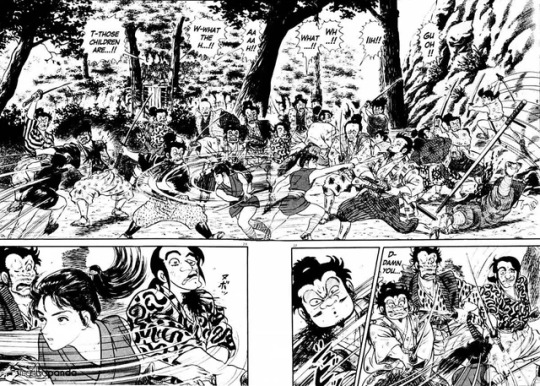
As I said, the manga Azumi is what I was hoping Blue Eyed Samurai would be. Azumi is a gritty look into (among other things) both shinobi and samurai that does not romanticize either, and has won an award for its exploration of these concepts in relation to buddhism. In fact, everyone in Azumi suffers. The only one who is perhaps glorified is Azumi, who many critics compare to a boddhisattva.
Throughout the story, Azumi works to not become too attached to earthly comforts, but still suffers because of her attachment to her companions. As Azumi completes her pruning missions for her boss (the Buddhist monk Tenkai), she accumulates a lot of bad karma in the form of endless waves of people pursuing her for either revenge, the bounty on her head, the thrill of defeating a master swordswoman, etc. Because of it, 90% of her closest companions SPOILER die, and many of her friends are raped or permanently maimed, and has to deal with the trauma and practical inconveniences of it. Often because they are caught in the crossfire between Azumi's targets or those who pursue her.
By the end of the story, Azumi still ends up making new companions like usual and her boss continues wanting to send her on pruning missions. But she decides to leave them all behind, so that those she cares about will not be affected by her bad karma again. She knows she will have to stay on the road indefinitely and will never really be able to enjoy the comforts of settling down, because of her pursuers. The series makes the buddhist argument that earthly attachment in general causes suffering, and Azumi is enlightened by abandoning those attachments and by facing her karma, although that does not mean she will not end up with a violent death. The story ends openly with Azumi wandering off into obscurity.
Time period
Some people began nitpicking the historical accuracy of my commentary, which wasn't really what I was concerned about. I am open to artistic liberty. However, with BES it was a little bit harder, since they made so many historical references and leaned into the jidaigeki genre, but then broke it in ways that came off as uncanny to me. Looking back, I guess this uncanny feeling was the orientalism letting itself be known, though I couldn't put it into words back then.
As jidaigeki is a subgenre of historical stories, certain cues does make me expect certain things. Like when I see an English-speaking gaijin as the antagonist, I would make the connection that this story is probably set sometime after the Americans forced Japan to open up for trade in the 1800s. Yet this expectation is then contradicted when I learn that no foreigners are allowed in Japan yet due to the Sakoku policy, which makes me wonder what this Irishman is doing here all alone centuries too early and how he even managed to climb to such a powerful position while being so isolated.
Gaijins as antagonists
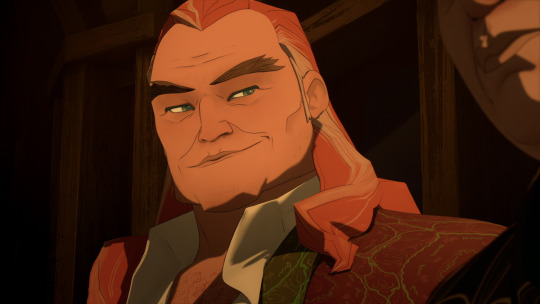
Why an Irishman as the gaijin antagonist? It'd make more sense if it was a portuguese or dutch. If Blue Eyed Samurai is set in 17th century Edo Japan, it's a long time off when the Americans forced Japan to put down the sakoku policy, and even then, why Britain/London? If anything, Japan and Britain liked each other enough to form an alliance for their shared fear of Russia.
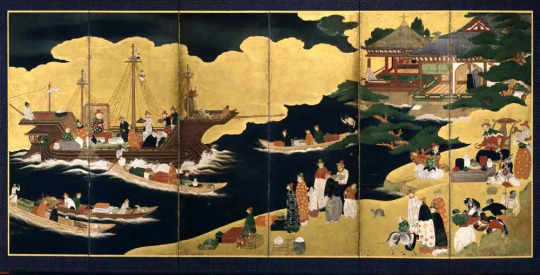

Why not other colonial powers who were actually active in Japan and Asia overall at the time (the Dutch) or the ones who caused Christianity to be banned during the sakoku (the Portuguese).
My first thought of a precedent goes to Konishi Shizune, the Christian revolutionary leader in Azumi who's also mixed race like Azumi, which is based on the historical Amakusa Shiro.
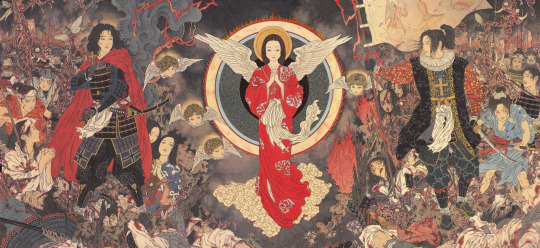
(Depictions of Gaijins: Americans during postwar Japan in Hajime no Ippo. Senator Armstrong in Metal Gear Solid)
Japanese in Europe
With Mizu heading to Europe, I came across people discussing the plot armor and how Mizu wouldn't stand a chance against the guns nor London police. It came off as kind of white supremacist, and the entire thread was locked because of unsolicited opinions from outsiders.
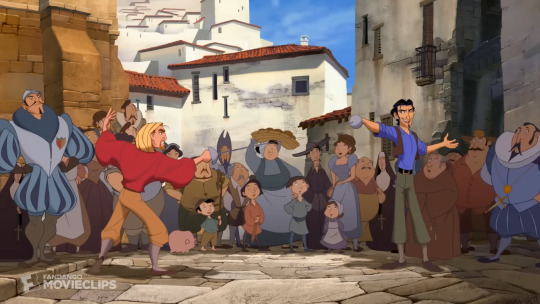
To be fair, Japan had guns too at the time. According to Netflix themselves, Blue Eye Samurai takes place in the 1600s. If that's the case, it means that the guns were mostly muskets, rifles and pistols which took time to load, so people did still use swords even in Europe. And only a century earlier in the 1500s, when Dreamwork's El Dorado is set, people would still use firearms and crossbows side by side, and Oda Nobunaga also used firearms in his own warfare during the sengoku period.
Also, the police didn't exist yet, since the UK police were created in the late 1700s. As for the London battalion or royal guards storming her, it'd either amount to when she was stormed by the hand claw guys. The plot armor in the first season was a lot imo even then though. But sneaking up on them depends on the terrain and context, so I can see it happening.
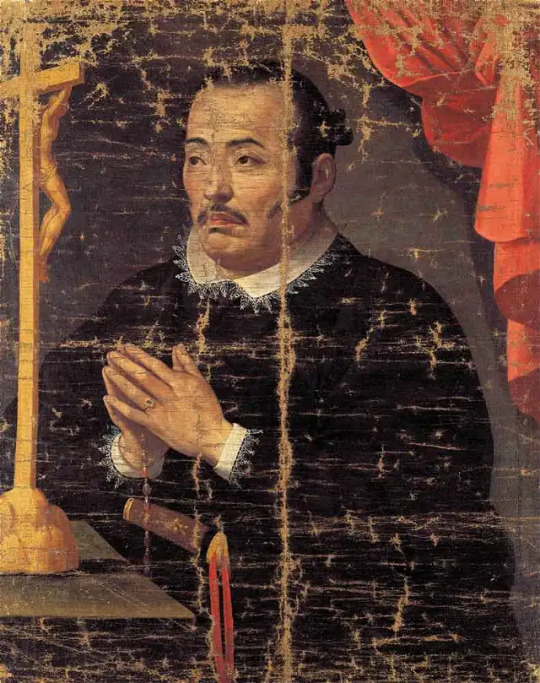
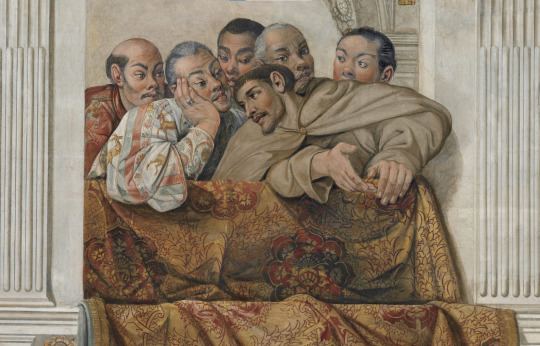
Furthermore, it's not unrealistic for Japanese people to travel to Europe, because there's historical precedence for this. In 1613, Hasekura Tsunenaga was sent on a diplomatic mission to negotiate with the pope and the king of Spain, and some of his men even stayed behind to form the Japon clan in Spain. The expedition took 7 years, and ironically enough, once he returned, christianity had already been banned in Japan. The people who still kept the Christian faith in spite of this came to be known as kakure kirishitan.
Debauchery means it's for adults ..
The way characters (esp. Mizu) will throw out badass oneliners as if on a treadmill, only to contradict exactly what she said as short as 5 seconds later does mess with my suspension of disbelief.
The story also goes into protitution and patriarchy, though it also felt superficial to me. If anything it feels like an excuse for fan service, similar to Game of Thrones in a sense. Like they know that sex sells, and that's what "the audience really wants." That said, again I enjoyed both GOT and Blue Eye Samurai, even though some may laconically break the former down to "dragons and tits" and the latter to "guts and tits".
Token representation
Mizu's apprentice was born without hands, which could have brought about an interesting exploration of disability. But instead, he's relegated to being a quirky sidekick and comedic relief..
BES is an American story
Blue Eyed Samurai has all the visual motifs of a Japanese samurai story (jidaigeki), but the tropes and logic is extremely American. It does get the artifacts and set dressing of a jidaigeki story right (surprisingly accurate at some points), which is why it triggered the uncanny valley for me sometimes. When certain artifacts and set ups appeared, I expected it to follow certain tropes I'm used to from jidaigeki, but it didn't really do that.
Kung Fu Panda
In contrast, Kung Fu Panda is also in the same boat. It has the artefacts of a Chinese wuxia story, but it is ultimately based on Chinatown (a theme park-esque idea of China designed by and to cater to white people, as a Chinese American defense mechanism). However, where Kung Fu Panda is an American love letter to Chinese kung fu films, Blue Eye Samurai isn't really a love letter to jidaigeki, and caters rather to white people's idea of the stereotypical samurai.
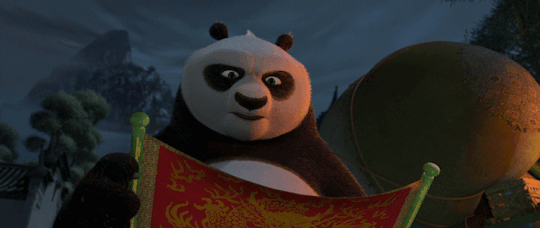
My understanding is that Kung Fu Panda is pretty popular in China.
Yes, Kung Fu Panda is popular in China. I also enjoyed Kung Fu Panda, which is why I used it to compare what I felt was lacking in Blue Eyed Samurai. If I had to choose one to rewatch, I would rather watch Kung Fu Panda.
That said, Accented Cinema points out that although Kung Fu Panda is often used as an argument of successful orientalism, it's rather about China's own failure in representing themselves. In my opinion, Kung Fu Panda's perhaps saving grace was that it didn't take itself too seriously, yet still delivered on the serious bits when it needed to.
Patriarchy and gender roles
While I understand and appreciate your critique, I don't think the narrative is grounded in realism. It's more like expressing the need that women do have to see themselves in the shoes of a physically invincible protagonist. Also the motivation isn't simply revenge - what has happened to Mizu has convinced that her very existence is suffering. She's internalized the hate to an extent that it no longer matters whether she lives or dies. She will slowly change as a person and her motivations will also change, which I hope we get to see . All the characters are somewhere trying to rebel against their gender roles, and that I feel is the 'message'. Also as far as the right antagonist to show goes, Fowler seems an indictment of British colonialism a few centuries too soon, but his attitudes aren't unfamiliar. At all.
Blue Eyed Samurai doesn't explore the concepts it references or markets itself with, but seems to throw them around because samurai and honor sounds cool and is a stereotypically Japanese/Sinosphere thing. Instead it'd rather explore gender roles and patriarchy. And the character Blue Eyed Samurai primarily uses to explore these themes with isn't the titular protagonist, but rather Princess Akemi.
But Akemi's struggles with patriarchy, also comes off as more a Western suffragette story than a Sinosphere one.
The Princess as a Caged Bird
Other stories about gender roles and patriarchy in ancient Japan to which we can compare this to is probably Isao Takahata's Princess Kaguya, though this one is probably set long before BES in the Heian period.
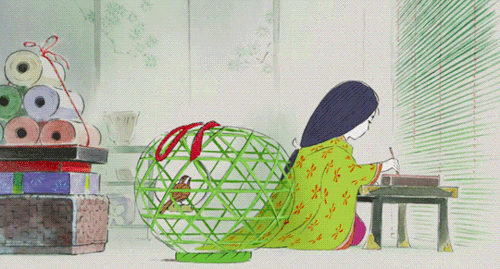
Like in Kaguya, the ohaguro set is presented as a symbol of oppression for Akemi. However, instead of being explicitly oppressed by outside forces like Akemi, Kaguya is instead pressured by societies and her father's idea of what a princess should be to become happy. Throughout the film, Kaguya questions what it is all for and even counters against her governess that "a princess is not a human then!"
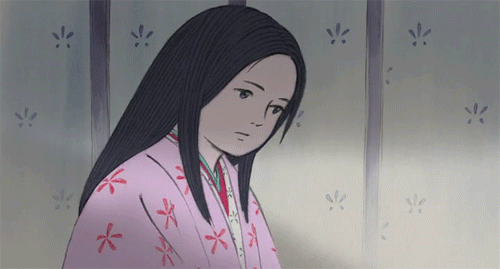
Princess Kaguya as a roadside flower. To be plucked in a moment of fancy, and neglected once savored and bored. Merely a trophy to be won and stowed away in a display cabinet.
The film explores what makes life worth living, by exploring the difference between humanity and moon people.
Filial piety. Fulfilling your own dreams through your offspring. Showing off achievements to relatives (accumulating merit).
Geisha and maiko in contrast to the Oiran of the red light district. Streetwalkers. Prostitution - the world's oldest profession.
Oda Nobunaga's younger sister in Nobunaga Concerto and Azumi.
Hypergamy. Tradition of men being adopted into the wife's household. The Fujiwara clan of the Heian period, who continuously married their women into the imperial family for generations. Attitudes around cheating and monogamy (Genji Monogatari).
The Fallacy of the Stereotypical Asian woman
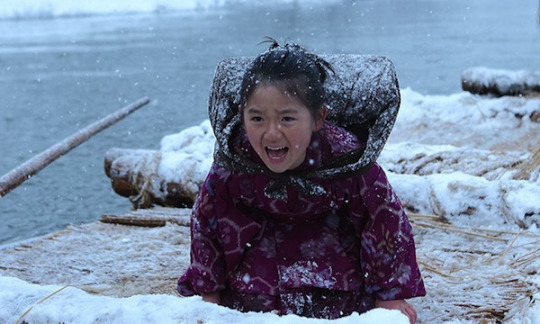
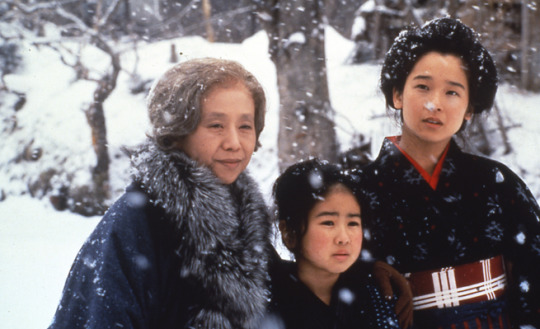
Oshin - Resilience and endurance.
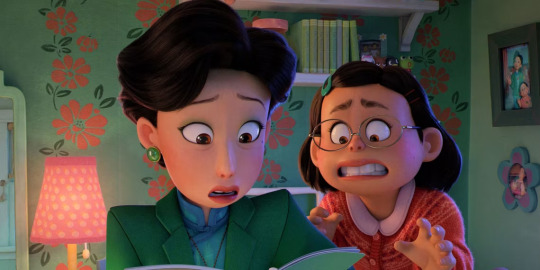
Asian women as firecrackers. There's a reason why the stereotype of Tiger Mom even came to be, because Asian women and people in general are not weak and strictly submissive, although they are often mistaken as doormats.
Honne and tatemae
Yamato Nadeshiko
While writing about this, I ended up going on a tangent about Asian women, which you can read here: The Fallacy of the Stereotypical Asian Woman.
Gender roles in Genderbender
Kaze Hikaru
Ryou
Torikaebaya Monogatari, where a brother and sister in the Heian period is gender mixed at birth, to fulfil gender roles they're more "suited" for according to societal expectations. Another Heian period text about a guy who crossdresses as a woman to get close to a woman he has a crush on.
Gender fluidity has been the norm throughout most of history.
A wolf in sheep's clothing
I guess the show is more concerned about gender roles and patriarchy. I'm actually not all that concerned with historical accuracy, but I couldn't help but be thrown off by how it felt like vastly different time periods (and thus different expectations in terms of jidaigeki tropes) were meshed together. I still stand by that the show is a very (overseas Asian/) (Asian) American narrative, which made it uncanny how accurate it still was in terms of getting the artefacts etc. of a jidaigeki right. Sort of like a "wolf in sheeps clothing," though that doesn't make it a bad thing. For example, Akemi feels more like a Western suffragette, rather than an Asian feminist. Yet the ohaguro set etc. may be a reference to Isao Takahata's Princess Kaguya, which is about feminism.
The story came off as stereotypical to me. Yet it does get the artifacts and set dressing of a jidaigeki story right (surprisingly accurate at some points). I did cringe at some points or feel the uncanny valley, but again overall the show was engaging and enjoyable.
I've enjoyed other orientalist stories before, such as Kung Fu Panda and Avatar the Last Airbender. I've also enjoyed occidentalist stories like mohuan and isekai. Yet something with Blue Eye Samurai made me cringe sometimes. Comparing it to the others I've mentioned, perhaps it's because it's set in a more non-fantastical setting as opposed to a jianghu of sorts idk. Blue Eye Samurai is still entertaining though, and may be the start of a new genre.
It's hard to explain what it feels like for people who don't have the same cultural references, so here's an example of occidentalism. I noticed that when Genshin Impact (a Chinese game) released the new Fontaine region where they decided to mix Britain, Italy, France etc., which people claimed is just plain weird haha. But Fontaine has still been well received regardless it seems. On the other hand, I still cringe every time I see Senator Armstrong in Metal Gear Solid.
Historical references
Random, but here's a list of different artifacts and set dressings that appeared in the show. The little theatre play about the ronin and his wife uses kurogo (black clad actors) to manipulate the dolls, which was novel to see. Previously I've mostly watched kurogo being used to manipulate perspective such as in this Matrix Ping Pong skit and the Tokyo 2020 pictogram opening ceremony. Traditionally, Kurogo is used in Kabuki to create special effects and are supposed to be invisible to the audience.

Mizu's husband uses a naginata, which is basically a spear. Although also used by warriors in general, it was often used by women.

#Blue Eyed Samurai#Netflix#review#criticism#Azumi#Kung Fu Panda#Ghost of Tsushima#Avatar the Last Airbender#samurai#bushido#shinobi#ninja#onryo#gaijin#Sakoku#karma#revenge#uncanny valley#kurogo#feminism#orientalism#occidentalism#decolonization#blog
86 notes
·
View notes
Text


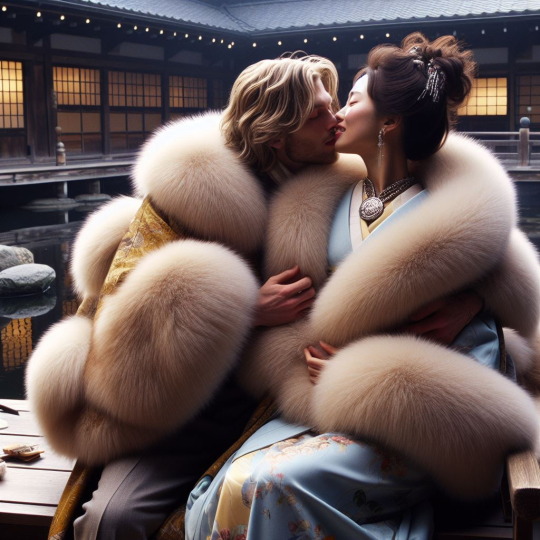
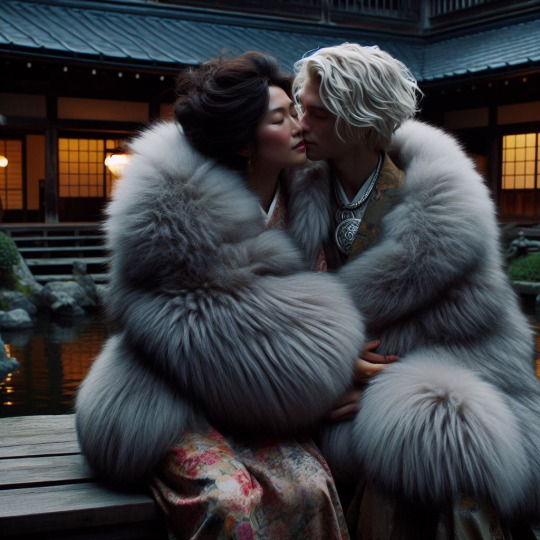

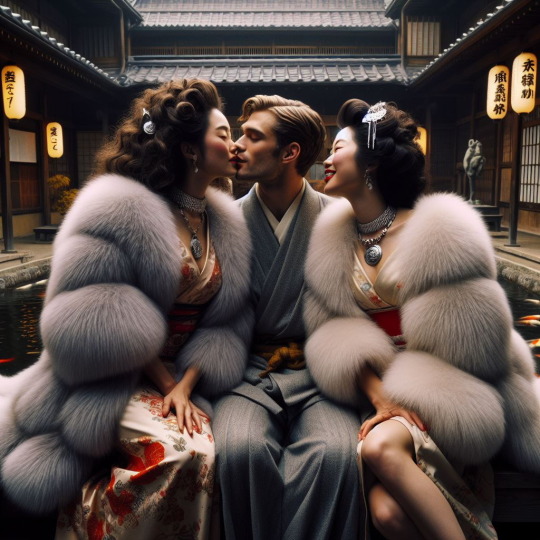
Lucky gaijin.
#fluffy#fluff#fourrure#fur#fur coat#fox fur#white fox#silver fox#gaijin#japanese women#beautiful asian girl#asian women#ai image#ai generated#kimono#women in fur
24 notes
·
View notes
Video
youtube
Hi everyone, long time! About 4 years or so. I hope you’re all doing well.
Like for many of you (I would imagine) the last couple of years have been pretty rough. I had to put my attention elsewhere and I fell off the social media map for a while. I’m still working on getting back up to speed and in the swing of things.
I started a new YouTube channel with my good friend, DJ 5DucK, about all things Japan, and our experiences living there and working in the Manga and Music industries respectively. It's called Cringe Musume.
If you're interested in knowing a little bit more about me or what daily life in Japan is like for a Western comic book artist, please subscribe to our Cringe Musume YouTube channel! We upload videos frequently and do our best to make them both informative and visually entertaining!
Hope to see you there, and of course, don't forget to like and comment! We appreciate everyone's input! I hope this message finds you well!
#Cringe Musume#Felipe Smith#DJ 5DucK#Japan#Anime#Manga#Otaku#Weeb#クリンジ娘#フェリーペスミス#漫画#アニメ#ポッドキャスト#外人#Gaijin
26 notes
·
View notes
Text



@pencilbrony
28 notes
·
View notes
Text

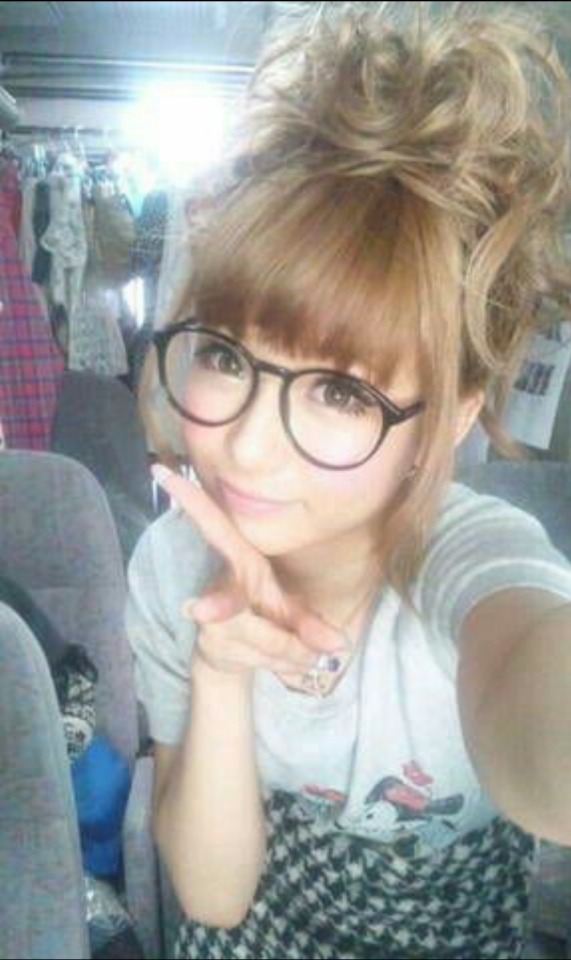



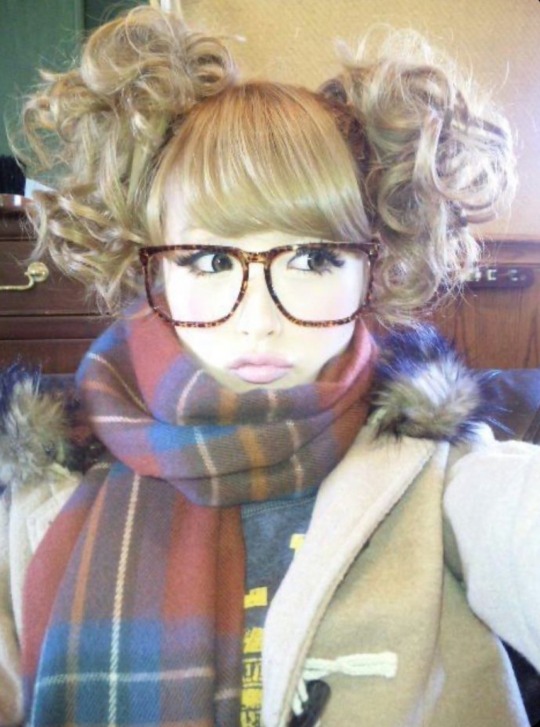
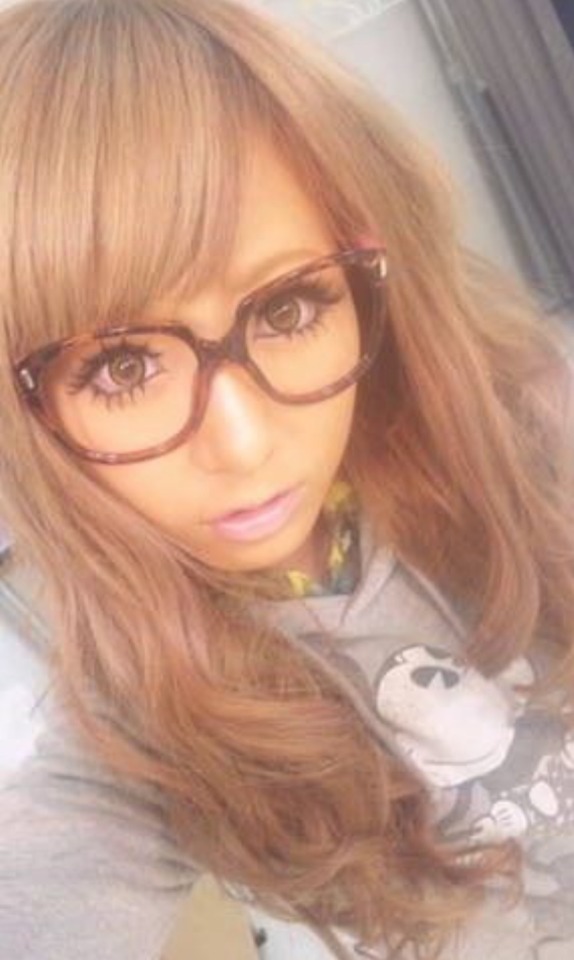
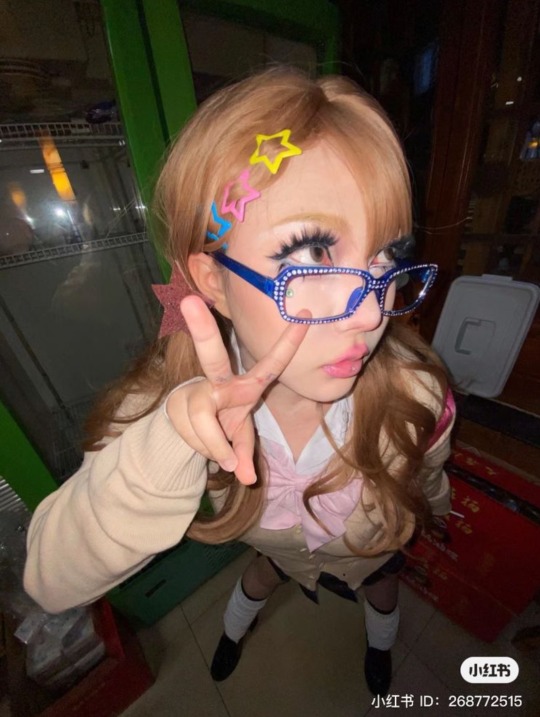

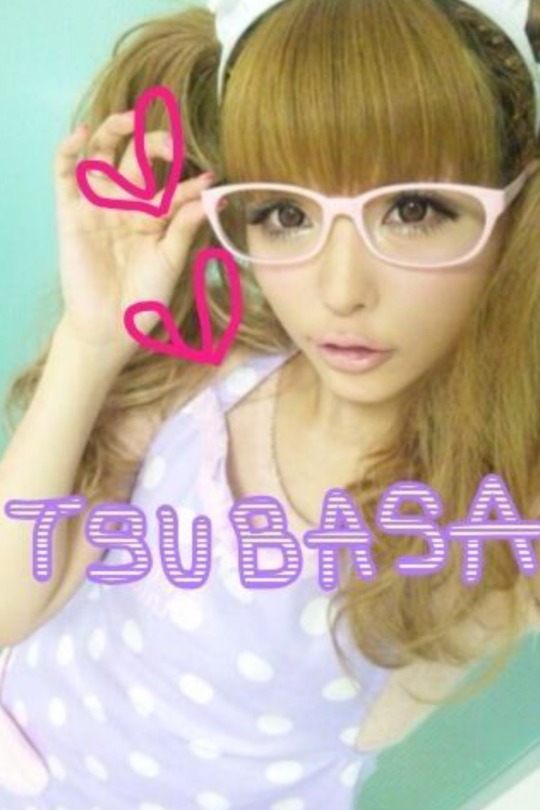
gals with glasses pt 2!!~おかわ
#gal#gyal#gyaru#ギャル#cute#kawaii#gyaru makeup#ageha#kogal#kogal gyaru#kogal fashion#roma#roma gyaru#rokku gal#rokku gyaru#goshikku#gaijin gyaru#gaijin#black gyaru#black gal#black ギャル#ゴシック#姫カジ#ロマ#コギャル#ロック
113 notes
·
View notes
Text
Staff transfers here have been amazing so far! Mainly cuz at my JHS an awesome JTE I worked with at another school came in. And at my ES it’s mostly folks from the smaller ES that closed and a few folks that I had worked with or met prior!
Just a shame this is happening a few months before I finish JET. Gonna enjoy it while I can.

#gaijin#gaijin life#inaka#inaka life#jet program#japan#japan life#ex pat#english teaching#teaching english
3 notes
·
View notes
Text

Do NOT FEED THE SNAIL!!!! NO MATTER WHAT BASEMENT GUY COOKS UP!!!! DON’T BELIEVE THEIR LIES!!!
#war thunder#gaijin#limethechef#the snail#no seriously#DON’T DO IT#IT’S NOT WORTH IT#the will of the snail is great#but I am greater
2 notes
·
View notes
Text

why are my oranges anime
3 notes
·
View notes
Text



Fifty Sounds, by Polly Barton
Some terrifyingly pithy observations about gaijin life
#just finished#books#reading#polly barton#fifty sounds#gaijin#japan exchange and teaching program#jet program#life in Japan#expat life
2 notes
·
View notes
Photo
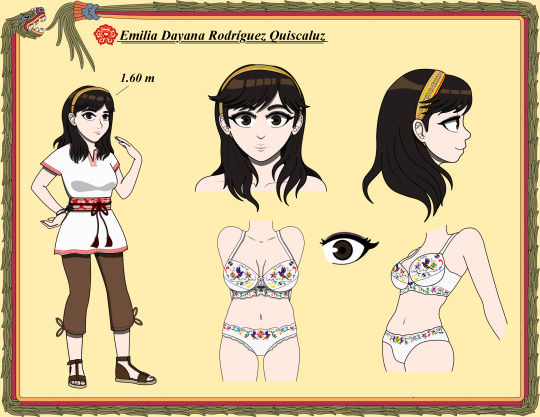
La bella Emilia, mestiza de blanca piel y obscuros cabellos y ojos.
Siempre alegre y optimista, junto a su compañera Natalia trata de sobrevivir el día a día en un extraño y caro Japón, en la historia "Gaijins".
https://www.wattpad.com/1056755244-gaijins-emilia
Boceto en colaboración de Katsu.Art.Draw en Ig
#arte#bordado#personaje#oc#character#design#dibujo#drawing#novela#español#gaijin#cuentos#historia#japon#mexico#wattpad#wattpad español#diseño
3 notes
·
View notes
Text

"Undertale 8Th Anniversary"
This was supposed to come out on Undertale's 8th anniversary, but it took way too long to finish (manly the characters, and there was supposed to be even MORE ! Lol) Oh well, i did the best i could, hope you guys like it !!
#my art#digital art#gaijin#artists on tumblr#digital drawing#art#illustration#undertale#undertale anniversary#undertale art#indie game#frisk#sans#papyrus#alphys#undyne#asgore#toriel#napstablook#flowey#mettaton#toby fox#temmie
130 notes
·
View notes
Text
A torturous joyous event
On Sunday October 10th, my school turned 100. From the minute I had stepped inside on my first day, the 5th, I had been bombarded with flyers and brochures and pamphlets and all that kind of stuff, all announcing the events of the day. I didn’t understand a single word, but the list seemed pretty long. Great! A cool day of celebration right as I arrive! Great opportunity to get to know the staff and students.
I was kind of bummed to already have to come into work on my first weekend in town, but I figured it was going to be fun. My supervisor warned me to wear my nice black suit, as there would be a short official ceremony. “Cool”, I thought, “I get to show them I clean up well and that I take tradition seriously”. I’m also told it’ll be a full day, so on Sunday I show up, full suited up, at 8am. Turns out, students have simple homeroom until noon. Seems kind of boring, but sure. I’ll stay at my desk and keep it warm until the festivities begin. Finally, 1pm, time to go the gym for the official ceremony, which will surely kick off the festivities. The gym is full of chairs carefully aligned and organized to separate the students into grades, with teachers off to the side. We sit down, and nobody seems excited. Weird. We are handed the ceremony’s program, and even though I still don’t understand a single word, I understand this : 1pm – 4pm.
Ah yes, a short ceremony by Japanese standards. I start sweating. I’m not nervous, but the gym is already an oven, with no windows and about 200 people in full suits. I lean over to my closest colleague, who’s not an English speaker, and try to ask her what’s on the program by repeatedly pointing and going "Nani desu ka?". I don’t get much of her answer, except for speech…speech… speech. Ok, so speeches. Nothing else, apparently.
The first event on the program was a ceremony over Zoom (yes, I too thought I was finished with Zoom) that was held at our town’s cultural center, a mere kilometer away. After the usual 10 minutes of technical issues and the Japanese equivalent of “I think you’re muted”, we were treated to around 1h30 of speeches, all very monotone and serious, with deep bows and polite clapping between each one. Every time, there was an awkward half-clap going on in the gym… Do you clap for someone who can’t see nor hear you? After a short break, the “real fun” began, according to my supervisor. See, in 1988, a young Japanese man named Suzuki Daichi won a gold medal for swimming (backstroke) at the Seoul Olympics.

Ah, that’s cool, an alumni went to the Olympics and won!
No! Actually, Mr Suzuki didn’t attend Minobu High, but a neighboring school who, unlike us, didn’t have a pool. So their swim team used ours. Anyway, because of this, my school has always been very proud of being the kinda-home of an Olympian. And today, Mr Suzuki was coming to deliver the keynote speech, which would last 1h30 (impressive, might I say). They showed a short documentary about his Olympic performance, and I, along with probably every girl in the gym, perked up at the footage of wet beefy 80s athletes in speedos. I’m glad to report Mr Suzuki is as handsome as he was in his youth.
Again, I didn’t understand much from his lengthy speech, only that it had to do with sports and how they can make life better and how Japanese youth need to be more active. The students didn’t seem all that excited for the last 45 minutes, which was mostly graphs and motivational quotes. I did notice members of the baseball team screamed at some point, so maybe something was said about their sport? Anyway, that concluded Minobu High School’s 100th anniversary celebration. We got a gigantic, beautiful bouquet of flowers that’s displayed in the hall, but otherwise, nothing much came of it. I’m at least glad that everyone else had a terrible time too, even while understanding what was being said. I don’t know which situation is worst. At least I got to zone out.
5 notes
·
View notes
Text

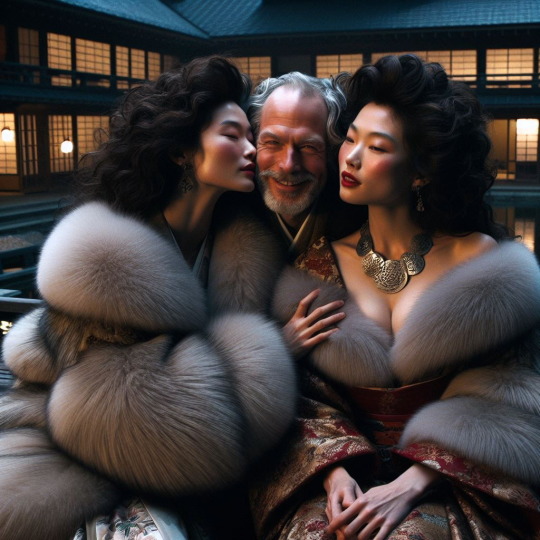
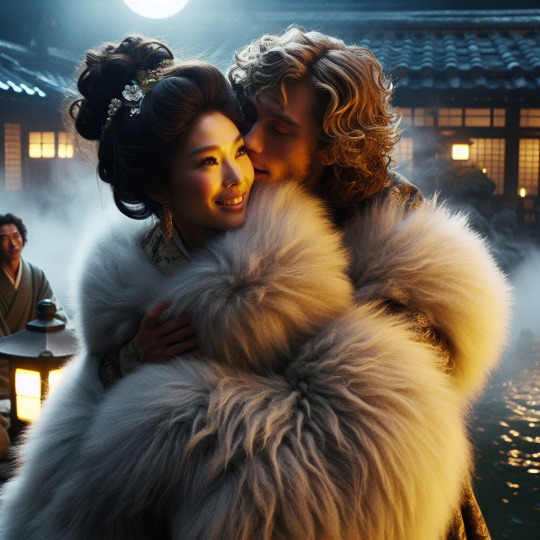

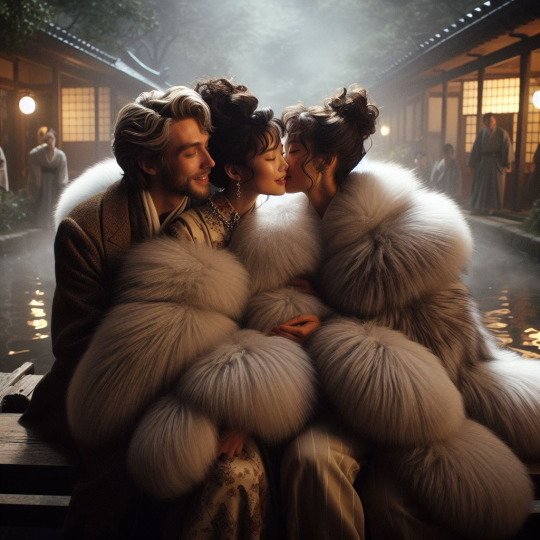
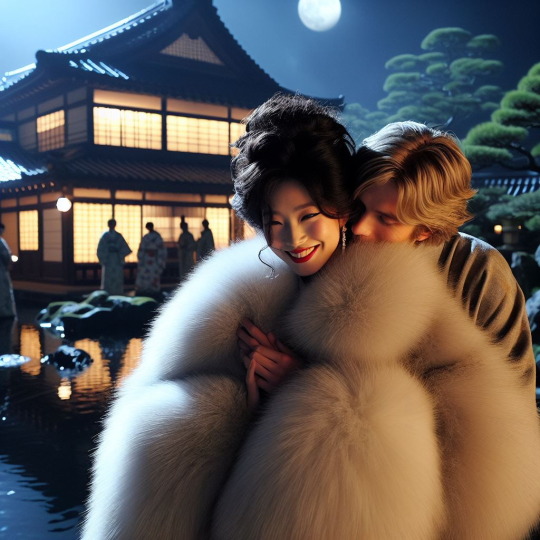
More gaijin.
#fluffy#fluff#fourrure#fur#fur coat#fox fur#fox fur coat#kimono#japanese women#ai image#ai generated#gaijin#white fox
16 notes
·
View notes
Text

クリンジ娘!
10 notes
·
View notes